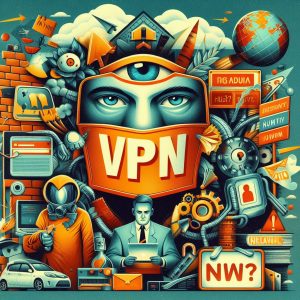I. Introduction
A virtual private network (VPN) has become an essential tool for protecting your privacy and security online. By routing your internet traffic through an encrypted tunnel, a VPN effectively hides many elements of your online activity to provide anonymity. Understanding what exactly a VPN conceals can help highlight the importance of utilizing this technology. In this article, we’ll explore what key identifying data is obscured by a VPN to enable private browsing and communication over the internet.
Definition of VPN
A virtual private network refers to a service that encrypts and routes your internet traffic through a secure tunnel between your device and the VPN server. This creates a private, anonymous connection that hides your online activity and identity markers from external parties. VPN services are offered by numerous providers for both personal and commercial use.
Importance of Online Privacy Protection
In our increasingly digital world, VPN services provide essential protection against growing online surveillance and security risks. VPNs hide revealing data that malicious actors or even legitimate network providers could otherwise intercept or gather about your internet use. This protects against attacks, profiling, censorship and other privacy violations. For both individuals and businesses, understanding VPN concealment methods is key to preserving anonymity.

II. What a VPN Hides
By creating an encrypted tunnel and obscuring identifying information, there are three main elements a VPN effectively hides from external parties:
IP Address
One of the main things a VPN hides is your IP address. This is a numeric identifier assigned to your internet connection by your Internet Service Provider (ISP). Your public IP address can be used to pinpoint your location and monitor your online activities.
A VPN masks your home IP address by assigning you a different VPN IP address. All your network traffic appears to originate from the VPN server. This hides your network identity and location, preventing tracking of your usage habits.
Browsing Activity
Another way a VPN provides privacy is by preventing your internet browsing data from being logged by ISPs, Wi-Fi providers and sites you visit. This data reveals which websites you frequent, profiles your interests, and exposes your usage patterns.
By routing your traffic through an encrypted VPN tunnel, all that external parties see is encrypted data flowing to and from the VPN server IP. They cannot discern which sites you access since the VPN obscures your browsing trail.
Location
VPNs also hide your physical location by obscuring your true IP address which can be traced back to your city or even street address. By assigning you an IP address from the VPN server’s location, your whereabouts are fully masked from geolocation tracking methods.
No sites or services you use can discern your actual location while connected through a VPN tunnel. This prevents targeting based on your geography and protects your real-world whereabouts.

III. How a VPN Works
To understand how a VPN effectively hides so much of your digital identity requires examining how VPN encryption and routing functions work.
Encryption
VPNs use strong encryption protocols to scramble your data into indecipherable sequences of randomized characters as it travels through the VPN tunnel. This encryption is powered by hash functions and algorithms based on complex mathematical computations.
By encoding the contents of your network packets, your actual activities are fully disguised. Only the VPN provider’s server can decrypt the data as no outsider has the cryptographic key. This prevents any intercepted data from being deciphered.
Tunneling
The VPN connection protocol encapsulates your encrypted packets within multiple layers of concealment using methods known as tunneling. This further hides the origin, destination, and contents of your traffic from prying eyes.
Additional VPN tunneling protocols like L2TP/IPsec add extra security wrapping around your VPN connection to reinforce privacy. Together with encryption, tunneling enables anonymous routing of your activities through the VPN conduit.
Server Connection
Once securely encrypted and tunneled, the VPN redirects your web traffic through the most ideal server node within their infrastructure. This associates your connection with the IP address of whichever server your traffic exits through.
By linking your session to a different physical server location, you are digitally disguising your true location. VPN servers are optimized for performance, security, and maximizing privacy based on your use case.
IV. Advantages of Using a VPN
Understanding the scope of identity markers hidden by VPNs highlights the key advantages they provide:
Enhanced Security
By encrypting traffic and obscuring identifying data, VPNs significantly enhance your security posture during online activity. Your true IP address remains hidden, preventing cyber criminals from targeting attacks using your location. Encryption protects activities even on public Wi-Fi which is prone to snooping. Overall online exposure to malware and hacking attempts is reduced by the extra VPN security layers.
Bypassing Censorship
Governments and organizations often restrict access to certain websites and online services based on geographical IP blocks. For users within affected regions, connecting via a VPN tunnel allows bypassing location-based censorship. By masking your IP and assigning a new one from an uncensored area, you can freely access blocked content and information.
Anonymity
The combination of encryption, tunneling and replacing your IP enables achieving true anonymity online through a VPN. Your virtual identity, browsing habits, location, and usage traces stay completely private. No parties can profile your activities or tie behavior to your real identity. This allows safely expressing opinions, exploring interests, and maintaining confidentiality.

V. Limitations of a VPN
While VPNs provide vital anonymity protections, some caveats remain:
Trust in the VPN Provider
You must place trust in the VPN provider itself and its policies regarding privacy and tracking. Avoid free VPNs, which may log and sell user data. Paid services with strict no logging policies provide the highest standard of privacy.
Decreased Speed
Routing connections through a VPN can result in slower internet speeds due to the encryption processing and extra network hops to VPN servers. Look for high-bandwidth VPN providers with ample server capacity to maximize speed.
Legal Implications
VPN usage should adhere to relevant laws and terms of service. While bypassing geo-blocks is common practice with a VPN, accessing networks without authorization or distributing illegal content remain prohibited. Understand regulations when traveling or operating across borders.
VI. Conclusion
In closing, understanding exactly how much a VPN hides about your digital identity highlights the immense value of this tool in today’s interconnected world. By obscuring your IP address, browsing activities, location and usage traces, VPNs empower you take control of your privacy and security. While limitations exist, VPNs remain essential for online anonymity. Taking time to learn about VPN concealment methods allows using this technology safely, effectively and ethically. As our lives grow increasingly digitized, the protections of a reputable VPN will continue becoming a crucial component of everyone’s internet self-defense toolkit.